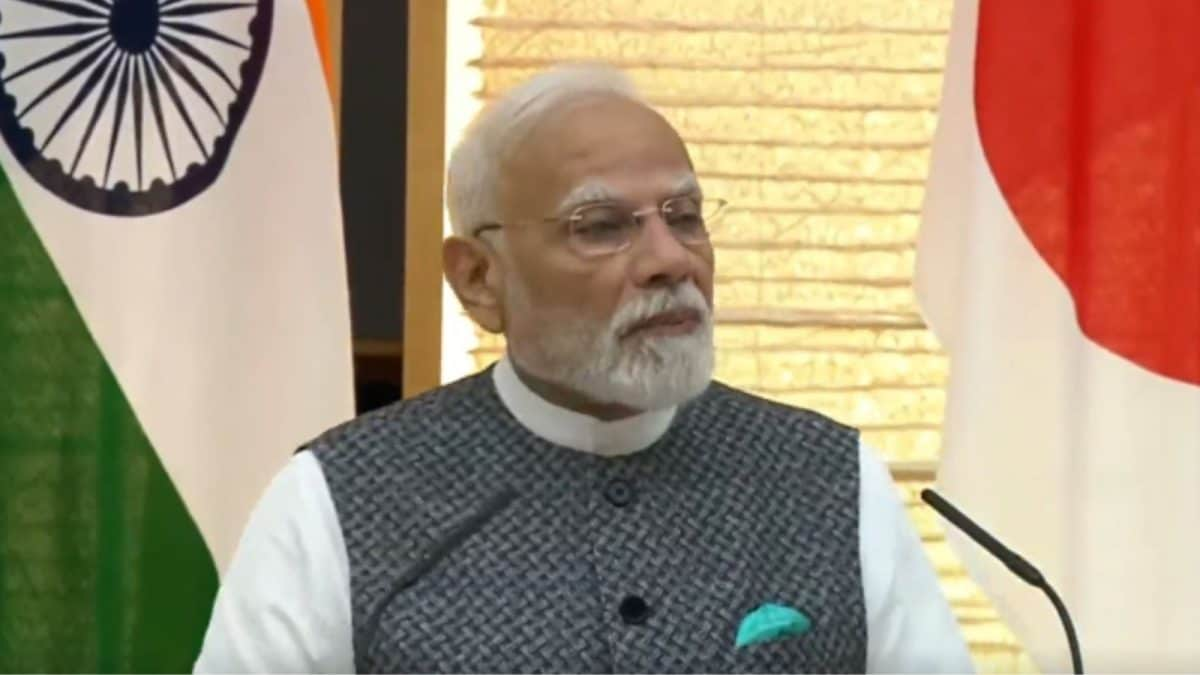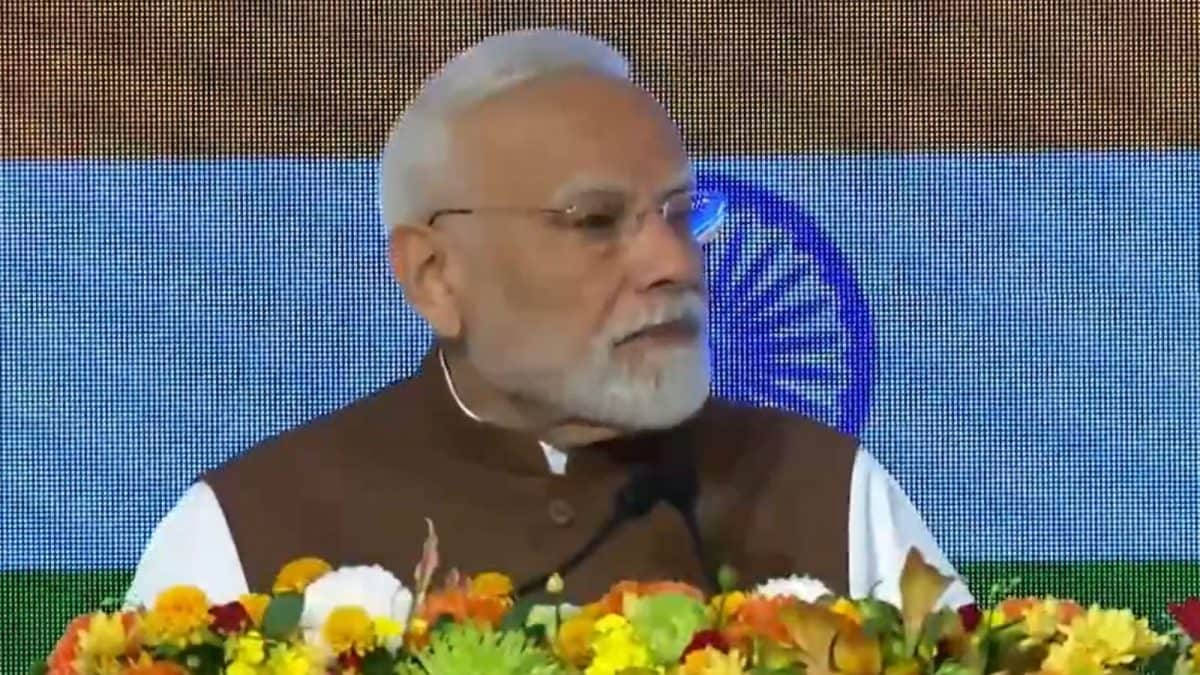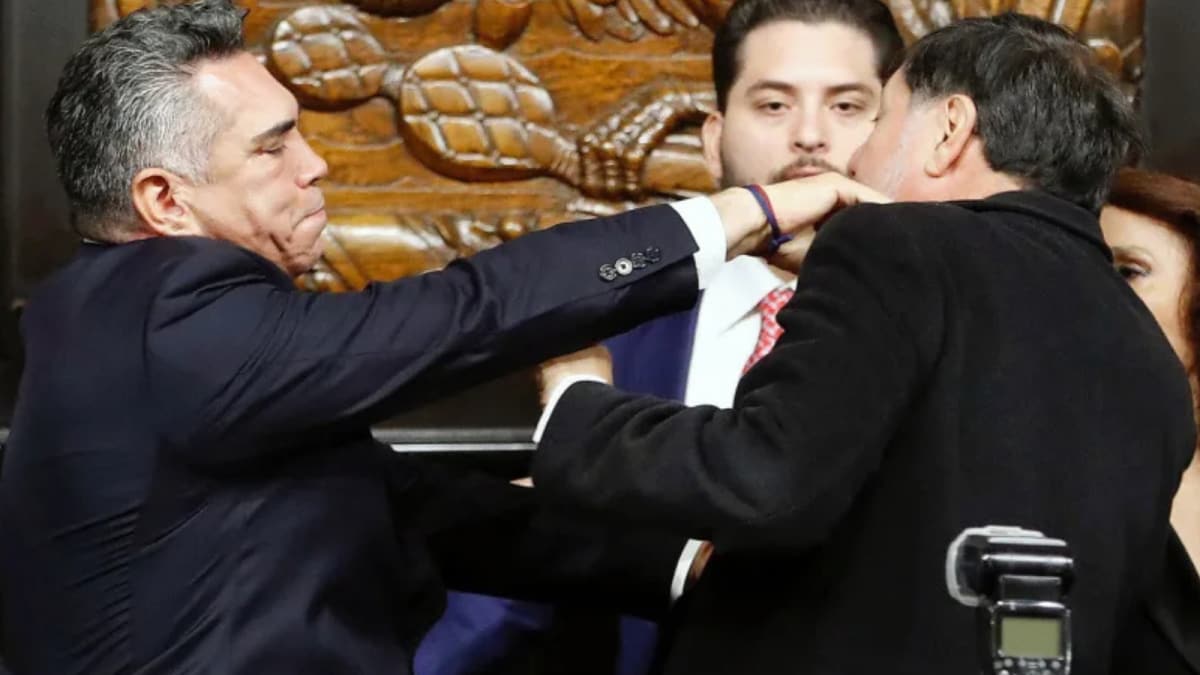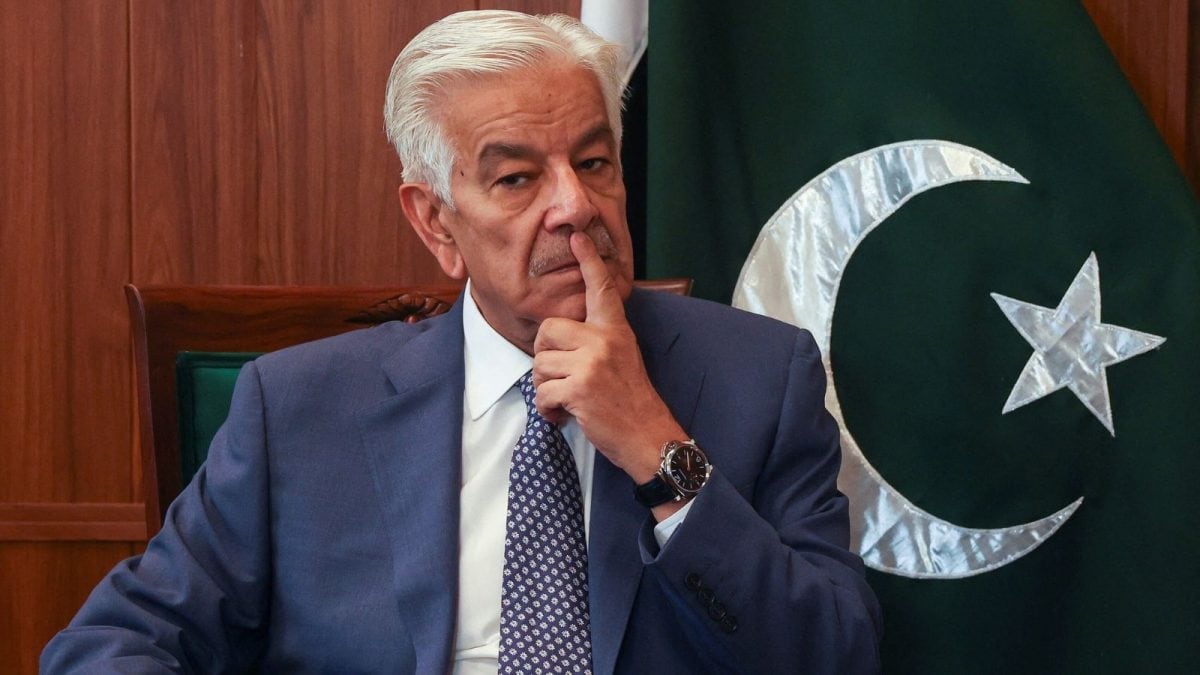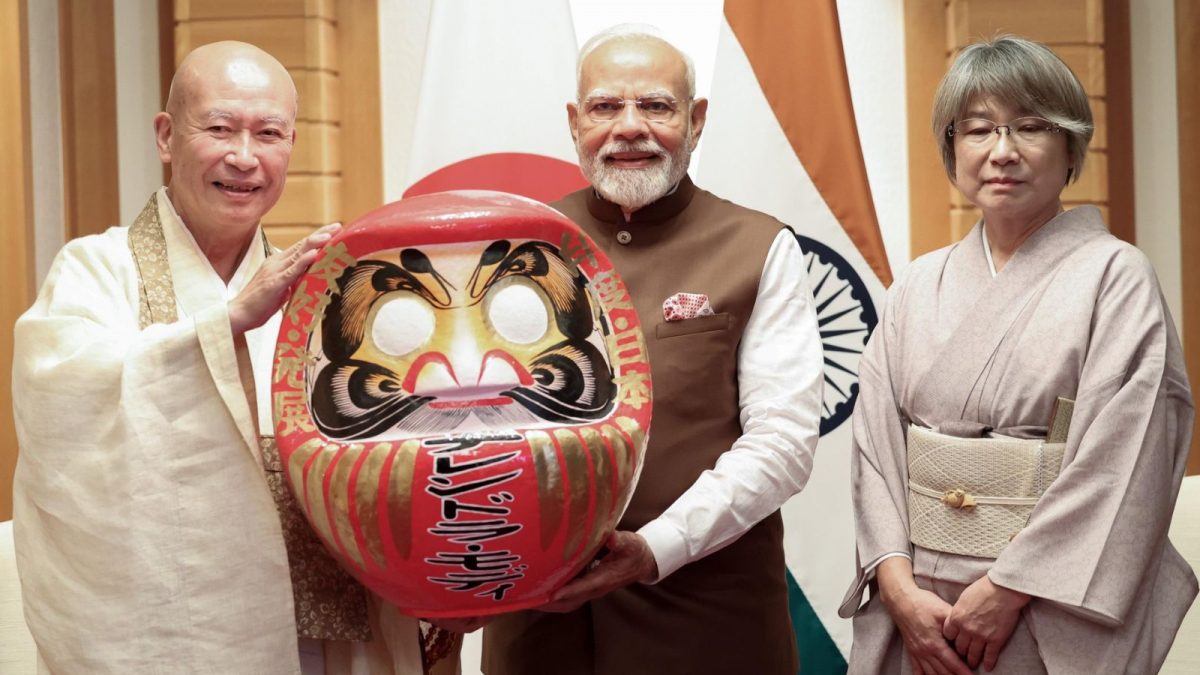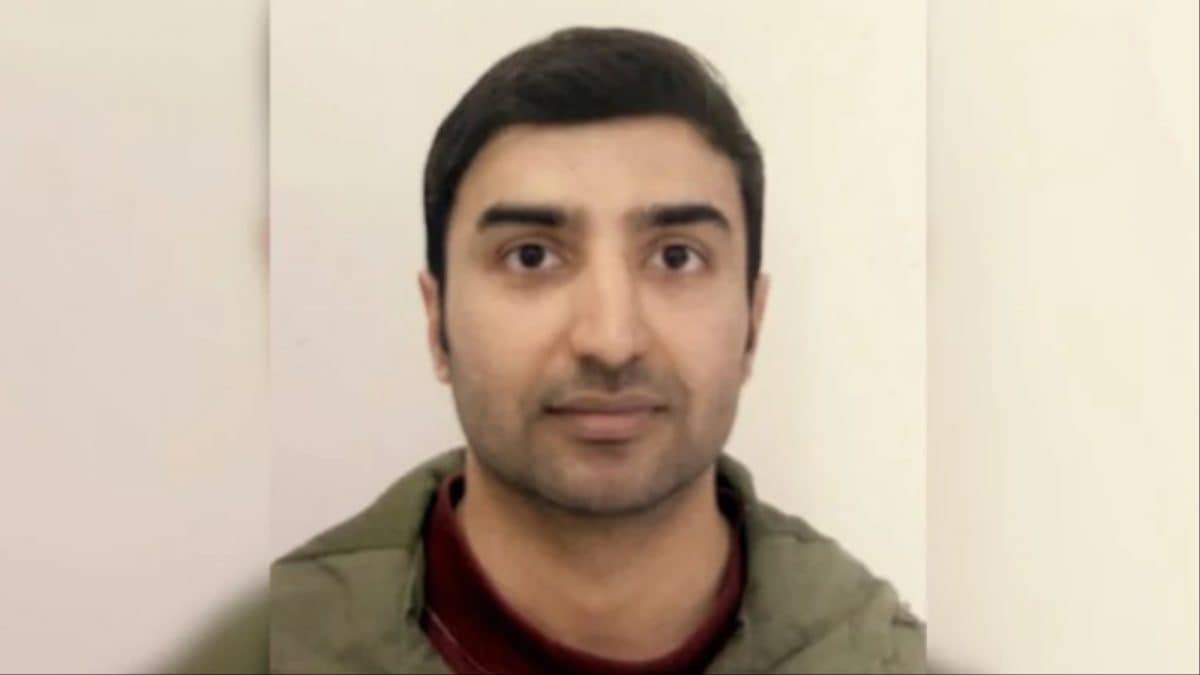Badenoch claims Starmer holding cabinet meeting on Gaza just to resolve 'internal party problem'
In her Talk interview Kemi Badenoch also criticised Keir Starmer’s decision to hold a rare, summer recess cabinet meeting to discuss Gaza this afternoon. She claimed that recognising Palestinian statehoood would not help and that Starmer was only holding the meeting to resolve an internal Labour problem (pressure from ministers and MPs for statehood recognition).
Asked if she supported recognising Palestine as a state, she replied:
No. I think it would be the wrong thing to do at this point …
Statehood gives Hamas power. And it’s yet another gimmick.
Why is he convening cabinet to talk about Gaza? He’s not convening cabinet to talk the migrant crisis. He’s now convening cabinet to talk all those farmers who are closing down their businesses, what they’re going to do about the economy, the debt crisis [that] seems to be looming.
He’s convening cabinet to talk about Gaza. He is not in a position to sort out that problem.
But, OK, let’s say we give statehood and then what? Does the problem disappear? No, it doesn’t. It doesn’t fix anything at all.
He is doing this to solve a political problem because a lot of people in his cabinet want statehood for Palestine. They are student campaigners, lifelong campaigners. This is the sort of stuff that they like. And he’s dealing with an internal party problem rather than dealing with the problems of this country.
Key events Show key events only Please turn on JavaScript to use this feature
Here are some more pictures from the pro-Palestine demonstration outside Downing Street today.



French foreign minister urges Starmer to stop prevaricating over recognising Palestinian statehood
The French foreign minister, Jean-Noël Barrot, has implictly urged the UK to stop prevaricating over recognising Palestinian statehood, Patrick Wintour, the Guardian’s diplomatic editor, reports. In a post on social media he says:
In a closely argued speech to UN on Monday the French foreign minister Jean Noel Barrot subtly aimed some of his fire at those countries still setting preconditions for Palestine’s recognition, or which still insist on “roadmaps to recognition”.
He said France was making “an appeal to those countries that have not yet recognized the State of Palestine. It is today that your decision will have the maximum impact on the course of events. Waiting for Hamas to disarm before recognizing a State of Palestine means placing yourself in the hands of Hamas. Yitzhak Rabin {former Israel PM} understood this very well, he fought terrorism as if there were no peace process, and he pursued the peace process as though there were no terrorism. It is by recognizing Palestine today, you will create the conditions for the elimination of Hamas”.
He also pointed out the Palestinian Authority President Mahmoud Abbas in his letter to the French President Emmanuel Macron had met all the preconditions for recognition set out by Benjamin Netanyahu in his 2009 speech at Bar-Ilan University.
Barrot said in the letter Abbas “for the first time condemns the terrorist attacks of October 7, calls for the immediate release of hostages detained by Hamas, demands its disarmament and exclusion from the governance of Gaza; he confirms the end of the allowances received by the families of prisoners convicted of terrorism, announces a reform of school textbooks to remove all hate speech, commits to holding presidential and legislative elections in 2026, and accepts that the Palestinian state will be demilitarized – there we have all the conditions stipulated by Prime Minister Benjamin Netanyahu in for the preconditions for a Palestinian state”.
France was repeatedly praised by delegates at the UN conference for taking the initiative on recognition. Quite why Starmer has handled this with the caution he has - other than Trump - will doubtless be explained by No 10 later. But as it stands, it looks as if he is buffeted by conflicting pressures, as opposed to following any logic.

James Ball, a journalist specialising in technology and politics, writes for the New World, which used to be called the New European and which was set up to fight Brexit. There is no paper in Britain more critical of Nigel Farage. But, on the Online Safety Act, Ball broadly agrees with Farage. He has explained why he thinks the legislation is flawed in a long post on his Techtris Substack blog. Here is an extract.
Using a paid VPN is good for your online security – it can help restrict tracking and protect you from sites trying to steal your card details. But teenagers downloading and using VPNs will inevitably be looking for free services, and these are a very different story.
At best, they’re monetising by selling browsing data, showing questionable ads, or some similar practice. But malicious software often poses as VPNs and is then used to harvest and steal credentials used while the VPN is running – which might include the bank or card details of parents using the same laptops, phones or networks.
Not every teen is going to be tech savvy or connected enough to set up a VPN, but others will try different ways to avoid age verification tech. That means a lot of them will look for small or niche adult sites, who haven’t bothered trying to comply with the law – unlike the relatively ‘respectable’ mainstream adult companies. This does mean that one unintended consequence of age verification could be sending teens towards more extreme adult content than they would otherwise deliberately seek out.
Nigel Farage, the Reform UK leader, and Peter Kyle, the science secretary, have been continuing to argue online about the Online Safety Act.
After Kyle posted a message saying Farage’s position meant he was on the side of predators (see 9.06am), Farage posted this:
If this act is to protect children, why are you setting up an elite police unit to monitor comments on asylum hotels?
Farage was referring to reports that the police are setting up a Internet Intelligence Investigations team to “provide a national capability to monitor social media intelligence and advise on its use to inform local operational decision-making”. This is not directly related to the Online Safety Act.
In response, Kyle posted this:
This is what the Act you would scrap makes platforms do:
• Detect and remove horrific child sexual abuse material, using hash-matching.
• Prevent grooming and stop strange adults messaging kids.
• Keep children’s profiles and locations hidden.
• Stop kids seeing porn.
Farage says Kyle shouldn't be making Jimmy Savile-type accusations given Starmer's record at CPS
Nigel Farage, the Reform UK leader, has defended his opposition to the Online Safety Act. Speaking to Sky News, he said:
This is legislation that we’re told is designed to protect children, but it doesn’t because they’re tech savvy and they go on to VPNs, and some of these [VPN] sites have had increases of thousands of percent in the last three days alone …
This legislation is driving people towards going towards VPNs and accessing not online pornography, but actually material that’s on the dark web. This may well do more harm than good.
Farage also repeated his claim that it was a disgrace for Peter Kyle to say being opposed to the act meant Farage was on the side of people like Jimmy Savile. (See 8.30am.) He went on:
People in glass houses – perhaps you should remember that his own leader, Keir Starmer, had to apologise for not prosecuting Jimmy Savile.
That was a reference to Keir Starmer issuing an apology on behalf of the Crown Prosecution Service, when he was director of public prosecutions, for the fact that accusations against Savile never led to his being charged. Starmer was apologising as head of the institution, not because he had been involved personally in any of its decisions relating to Savile.
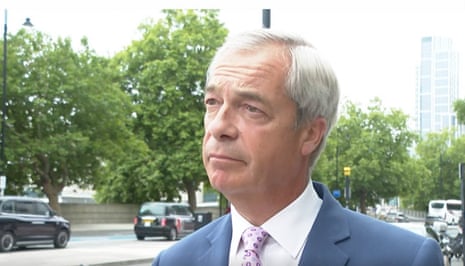
The Liberal Democrats have called for the government to publish its legal advice on the legality of Israel’s block on food aid going into Gaza. With the cabinet meeting now to discuss Gaza, Ed Davey, the Lib Dem leader, said:
There can be no denying that Israel has egregiously breached international law through its devastating blockade of Gaza.
The Australian prime minister said this two days ago. And yet the UK government continues to drag its feet on describing these acts as anything more than merely “risking” a breach.
Actions speak louder than words. It’s time for the attorney general to publish the legal advice he has given to the government on the Netanyahu cabinet’s grotesque restriction of aid to Gazans.
The government almost never publishes its legal advice on matters like this, or almost anything else.
Terrorism legislation watchdog calls for ban on teenagers using social media, saying Online Safety Act won't work
Jonathan Hall KC, the government’s independent reviewer of terrorism legislation, has said that he thinks the Online Safety Act will do “precious little” to protect children from harmful content on the internet.
In an interview with LBC, he said that he thought the only effective measure to address this problem would be an Australian-style ban on under-16s accessing social media.
Asked what the Online Safety Act would achieve, he replied:
Precious little. And the reason is that it’s not actually about removing particular content. It’s about creating systems, and those systems have got to be, in the jargon, proportionate, and that depends upon what the tech companies are willing to do, frankly.
And then Ofcom, who are the government’s regulator, who’ve got to enforce this, my word, they have got a massive pallet of threats to deal with. They’ve got to deal with child sex abuse, suicide videos, self-harm. By the time they get to just straightforward gory violence and terrorism material or knives, it’s going to be some way down the line. So I think you have to be realistic about this.
If you want my honest answer, and I’ve looked at this topic for a long time now, I think that children have got to stop using social media, full stop.
And I think we need to go down the line that Australia has pioneered. In my dreams, we would just have kids with dumb phones and a few apps, and that would be distributed on the NHS. And if the government was really bold, they would grasp this bull by the horns.
But I’m afraid the Online Safety Act is not going to be the solution.
Swinney says £180,000 funding for tournament at Trump's golf course not designed to 'butter up' US president
Scottish government funding for a golf tournament at Donald Trump’s Aberdeenshire course was not an attempt to “butter up” the US president, John Swinney has said.
As PA Media reports, the Scottish government announced on Saturday that £180,000 of public money would be spent to bring the Nexo Championship to Scotland next month – just days before the first minister met Trump.
Swinney said he had “courteous” talks with Trump this morning, ahead of the official opening of a second course in Aberdeenshire.
Asked if the funding for the tournament was an effort to “butter up” Trump, Swinney said:
No, I think what I was trying to do is to make sure that a tournament that was coming to Scotland could be properly promoted.
It’s coming here, we’ve essentially intervened to secure a tournament quite late in the day.
Swinney said the Scottish government provides cash to the Royal and Ancient Golf Club (R&A) in St Andrews. “If the principle is good enough for the R&A, it’s good enough for Trump ,” he said.
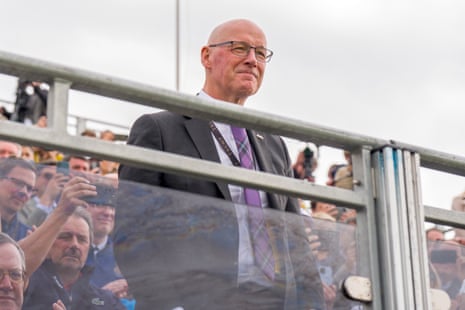

Starmer looks like 'hostage' in meetings with Trump, Badenoch claims
In her Talk interview Kemi Badenoch also accused Keir Starmer of looking like a “hostage” during his meeting with Donald Trump yesterday.
Referring to Starmer’s meetings with Trump, she said:
I think that he struggles to assert himself in those meetings. It looks like he’s a hostage. He’s sitting there terrified about what lines he can take, whereas President Trump is quite freewheeling. I think Keir Starmer doesn’t really know how to how to deal with that.
What we need is to see the British prime minister standing up for our interests showing that he’s winning, and every time we see him with President Trump, it looks like it’s the US that’s winning.
Badenoch claims Starmer holding cabinet meeting on Gaza just to resolve 'internal party problem'
In her Talk interview Kemi Badenoch also criticised Keir Starmer’s decision to hold a rare, summer recess cabinet meeting to discuss Gaza this afternoon. She claimed that recognising Palestinian statehoood would not help and that Starmer was only holding the meeting to resolve an internal Labour problem (pressure from ministers and MPs for statehood recognition).
Asked if she supported recognising Palestine as a state, she replied:
No. I think it would be the wrong thing to do at this point …
Statehood gives Hamas power. And it’s yet another gimmick.
Why is he convening cabinet to talk about Gaza? He’s not convening cabinet to talk the migrant crisis. He’s now convening cabinet to talk all those farmers who are closing down their businesses, what they’re going to do about the economy, the debt crisis [that] seems to be looming.
He’s convening cabinet to talk about Gaza. He is not in a position to sort out that problem.
But, OK, let’s say we give statehood and then what? Does the problem disappear? No, it doesn’t. It doesn’t fix anything at all.
He is doing this to solve a political problem because a lot of people in his cabinet want statehood for Palestine. They are student campaigners, lifelong campaigners. This is the sort of stuff that they like. And he’s dealing with an internal party problem rather than dealing with the problems of this country.
Badenoch says Online Safety Act passed by last Tory government 'is not going to work'
Kemi Badenoch has said she does not think the Online Safety Act, which was passed by the last Conservative government but which is now being implemented by Labour, will work.
In an interview with Talk, she said she would not go as far as Reform UK, who want to repeal it. But there was “a lot wrong with it”, she said.
Even when she was in government, Badenoch was critical of the bill.
Asked today if she sided with Nigel Farage or Peter Kyle in their row about the bill (see 8.30am), she said she did not want to back either of them.
She went on:
I said at the time, this bill is not going to work. I actually managed to get it watered down. The version we’re seeing is the watered-down version.
We do need to do things to protect children from a lot of the harm that’s online. But I could just see the way it was written that as usual it would go after people doing perfectly legitimate things and the bad guys will still find a way to circumvent the rules.
This is the story of our times. More and more and more rules. Good people having to deal with more and more burdens, whether it’s on migration, whether its on business taxes. And then the bad guys find ways to circumvent.
And that’s what we’re seeing. VPN usage has shot through the roof. People are finding ways to bypass these laws …
I don’t think that the whole act should be scrapped but there is a lot wrong with it. We need to make sure that we protect children from harm but this is not the way to go about it.
At the opening of his new gold golf course in Menie, Aberdeenshire, a reporter from the crowd asked Donald Trump “what will you say next to Benjamin Netanyahu”, the prime minister of Israel.
Trump replied:
We’re working together to try and get things straightened out.

Britons are in favour of recognition of a Palestinian state by more than three to one, according to polling by Survation.
The poll, commissioned by the green entrepreneur, campaigner and Labour party donor Dale Vince, shows 49% of people in favour of recognising Palestinian statehood, and only 13% opposed.
It also suggests that, by a margin of almost five to one, people want the government to be more critical of Israel’s conduct in Gaza.
Vince said:
The British public have spoken, and they want recognition of Palestine, and for trade sanctions against Israel.
The images of starvation, and the daily killings of innocent men, women, and children, have horrified the public, who want the suffering to end and for the government to show no fear in confronting Israel head on over its merciless warmongering.
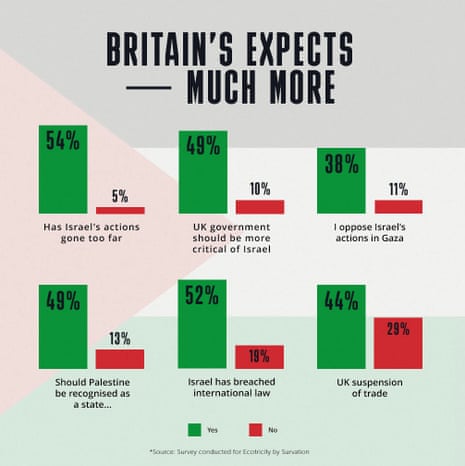
Palestinians need to be 'rewarded' with recognition of statehood after all they have gone through, Kyle says
Peter Kyle, the science secretary, has suggested that Palestinians need to be “rewarded” for what they have been through with the recognition of a Palestinian state.
He was speaking ahead of this afternoon’s cabinet meeting, where Keir Starmer is expected to set out details of a plan for peace in the Middle East.
This will reportedly set out a pathway for the UK to formally recognise a Palestinian state. But, according to a report in the Telegraph, “recognition of statehood will still be conditional on the delivery of a ceasefire and potentially the release by Hamas of the remaining Israeli hostages”.
In an interview on Times Radio this morning, Kyle rejected Israeli government claims that recognition of Palestinian statehood would amount to rewarding Hamas for the 7 October attack on Israel. He said:
Palestine has representation by Hamas in Gaza. It has the Palestinian Authority on the West Bank. It is a complicated, difficult set of circumstances.
But no longer can we sit back and see what is happening in that region and think that the Palestinian people should not be rewarded for what they’ve been through and have the tools at their disposal to move them towards the kind of peace, stability and dignity that every citizen in every country is owed.
When it was put to him at least some of the people being rewarded would be Hamas supporters, Kyle said he did not accept this argument. He went on:
Citizens need to be rewarded for what they have been through and they need to be supported into the future to deliver the kind of peace and security and at the end to the horrors.
The US has not recognised Palestine as a state and, when Emmanuel Macron said France would do so in September, the Trump administration criticised his decision.
But yesterday, in his Q&A with Keir Starmer in Scotland, Trump indicated that he would not object to the UK recognising Palestine. Asked about UK recognition of a Palestinian state, he replied:
I’m not going to take a position, I don’t mind him [Starmer] taking a position. I’m looking for getting people fed right now.

Libby Brooks
Libby Brooks is the Guardian’s Scottish correspondent.
Donald Trump and John Swinney have met on the final day of the US President’s visit to Scotland.
The meeting is understood to have lasted about 15 minutes and Scotland’s first minister raised the situation in Gaza with Trump.
The opening ceremony for a new golf course at his Aberdeenshire resort is now in full swing, with guests from Scottish politics as well as former golf champions including Paul Lawrie and Colin Montgomerie.
Trump began his speech by thanking Swinney before saying he would play a round of golf on the new course very quickly before returning to Washington DC to “put out fires all over the world”.


 1 month ago
1 month ago
